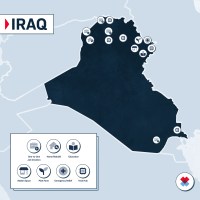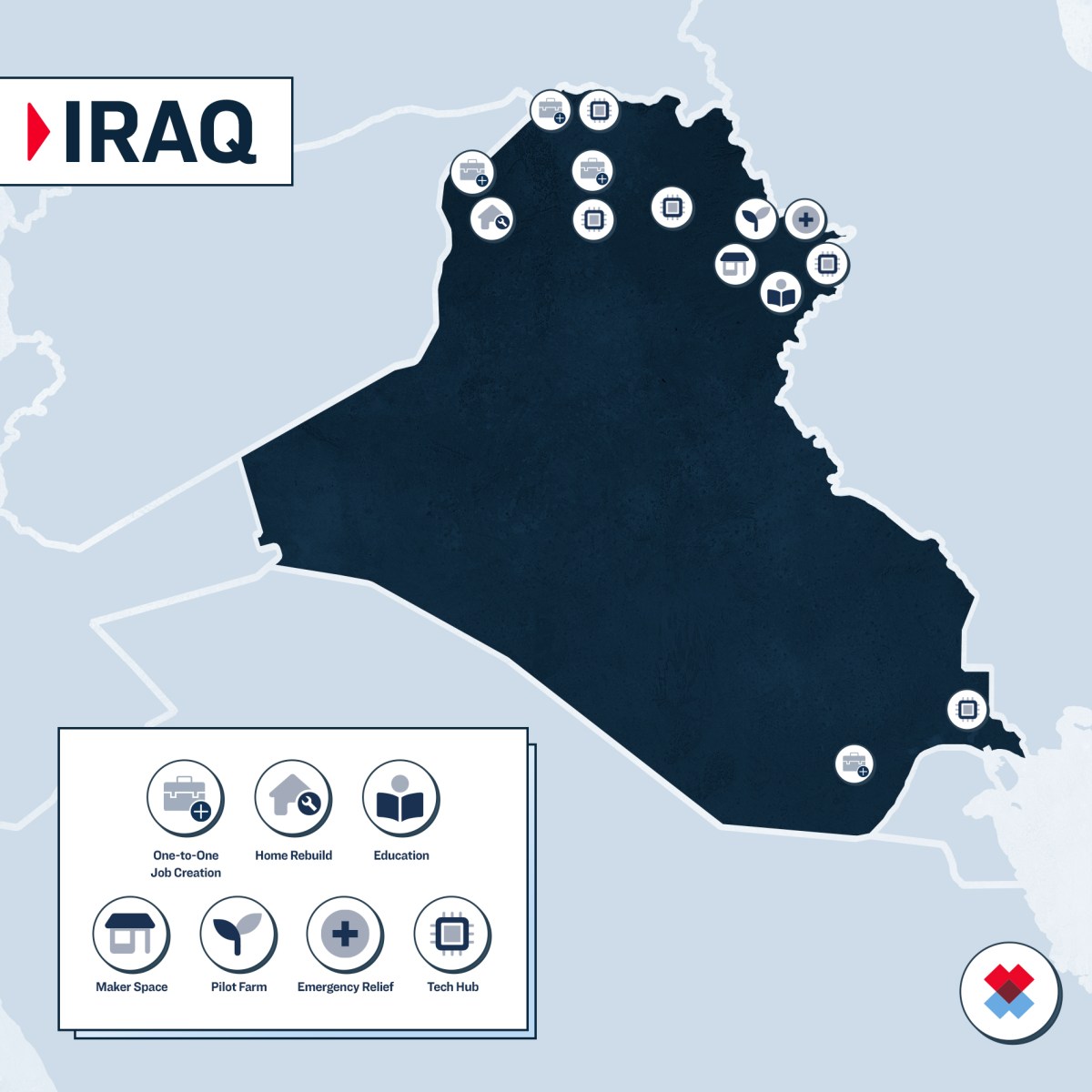Country Overview
Iraq limped into 2021 having suffered severe setbacks due to COVID-19. Iraq’s economy is based on oil. Between 2010 and 2020, oil revenues made up 99% of exports, financed 85% of the national budget and accounted for 42% of Iraq’s gross domestic product (GDP). When the price of oil plummeted during the pandemic, Iraq’s GDP shrank by 11%. The poverty rate increased from 20% in 2018 to 30% by the end of 2020. Other factors such as water shortages, high unemployment rates, the cost of rebuilding ISIS-destroyed cities, and security issues further slowed Iraq’s economic recovery.
Our relief response focused on self-empowerment through job creation, educational opportunities, sustainable agricultural projects, and home rebuilds. Together, with our community of peacemakers, we helped in the following ways:
- 615 proud new business owners, including 321 in the Yazidi heartland of Sinjar and 164 in Mosul’s Old City, opened their doors. These livelihoods enable moms and dads to feed their families and keep their kids in school while helping their local communities rebuild.
- 35% of our tech hub participants found jobs within 6 months after starting their courses. 681 young Iraqis, displaced Syrians and Yazidis, and Kurds started new careers in a labor market where one out of four people are unemployed. 127 tech hub workers participated in 21 machine learning projects, increasing their incomes by 1003% just 6 months after enrolling in the tech hub.
- 143 makers, of which 65 are female heads of households, created beautiful artisanal objects through our maker space. 66 of these artists are refugees working in a camp where having a steady income enables them to provide food and other necessities for their children.
- 214 students were able to continue their high school studies in that same camp, where we funded a high school for Syrian refugees. We also provided a bus to transport Syrian teens living outside the camp to the high school so they could continue their studies too.
- 71 moms, dads, and kids from 17 families were able to eat nutritious food grown during the first season of our sustainable pilot farm, which harvested 473 kilograms of produce. 6 natural farming techniques were piloted, and 12 semi-arid farming methods were used to grow 59 species of crops despite soil erosion and severe water shortages. 47,603 liters of rainwater were harvested on the farm.
- 62 people from 9 families had a place to call home after years of living displaced from their homeland because of war. When ISIS destroyed Sinjar, these families did not think they would ever be able to return to their ancestral homeland. We helped them rebuild their homes in their old communities because there is no place like home.
- We provided vulnerable people with emergency relief when disasters such as a fire in an internally displaced persons camp, the loss of a child, or the need for food aid arose.
Oil-Based Economy
Iraq’s private sector accounts for 40 to 50% of employment, but it is mainly in the informal economy, which is vulnerable. Most jobs in the informal economy are poorly paid, insecure, and lack benefits. The public sector accounts for the bulk of employment, making the economy reliant on government salaries. When the price of oil fell, the Iraqi government could not pay public sector salaries or pensions, leaving everyday people to fend for themselves.
Currency Devaluation
To counteract the decline in oil prices, the central government devalued the Iraqi dinar by 23% to make paying government salaries easier and to encourage people to buy local products. The problem was that Iraq does not currently produce much domestically. Many food products are imported from Turkey or Iran, so in the short term, there was rapid inflation, especially for food items, construction, and real estate.
Water Shortages
Iraq’s largest sources of water comes from the Tigris and Euphrates rivers, which flow into Iraq from Turkey and Iran. Both Turkey and Iran constructed dams which divert or block the flow of river water into Iraq, causing shortages. In 2021, the water supplied by the Tigris and the Euphrates was 60% less than in 2020. Water shortages caused smaller wheat harvests in a year with record low rainfall. Rising temperatures, a lack of rain, and less access to river water have made 7 million Iraqis water-insecure.
Unemployment
Unemployment levels among internally displaced persons, returnees, women, workers in the informal economy, and people who were self-employed before the pandemic remained high throughout 2021. Of the working age population, 25% are underemployed or unemployed, and the number is much higher in rural areas. High youth unemployment, in addition to currency devaluation, political corruption, and a lack of reliable access to water and electricity, drove protests calling for political change.
Security Issues
The high cost of maintaining security forces post-ISIS means the Iraqi government has less money to spend on investment, public services, health care, education, and diversifying the oil-based economy.
Although Iraq is not currently at war, there were acts of violence such as a suicide bombing in Sadr City, ISIS attacks in Diyala, and demonstrations and protests against the economic and political situation in many parts of the country.


